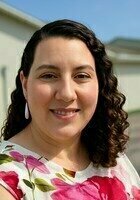All Common Core: 6th Grade English Language Arts Resources
Example Questions
Example Question #11 : Capitalization, Punctuation, And Spelling: Ccss.Ela Literacy.L.6.2
Select the answer that correctly uses parentheses to set off a non-restrictive or parenthetical element.
Claire who was 11 years old was presented with a medal for winning (the chess tournament).
Claire who was 11 years (old) was presented with a medal for winning the chess tournament.
Claire (who was 11 years old) was presented with a medal for winning the chess tournament.
Claire who was 11 years old was presented (with a medal) for winning the chess tournament.
Claire (who was 11 years old) was presented with a medal for winning the chess tournament.
Correct Answer: Claire (who was 11 years old) was presented with a medal for winning the chess tournament.
Explanation: A non-restrictive or parenthetical element is a part of a sentence that can be removed without changing the sentence’s meaning. The sentence would still make sense without the parenthetical element.
In this case, “who was 11 years old” is the non-restrictive or parenthetical element. We don’t need this information to understand the sentence. Claire was presented with a medal for winning the chess tournament.
Example Question #12 : Capitalization, Punctuation, And Spelling: Ccss.Ela Literacy.L.6.2
Select the answer that correctly uses dashes to set off a non-restrictive or parenthetical element.
The two - most populated countries - China and India are in Asia.
The two most populated countries China - and India - are in Asia.
The two most populated countries - China and India - are in Asia.
The two - most - populated countries China and India are in Asia.
The two most populated countries - China and India - are in Asia.
Correct Answer: The two most populated countries - China and India - are in Asia.
Explanation: A non-restrictive or parenthetical element is a part of a sentence that can be removed without changing the sentence’s meaning. The sentence would still make sense without the parenthetical element.
In this case, “China and India” is the non-restrictive or parenthetical element. We don’t need this information for the sentence to make sense. The two most populated countries are in Asia.
Example Question #13 : Capitalization, Punctuation, And Spelling: Ccss.Ela Literacy.L.6.2
Select the answer that correctly uses commas to set off a non-restrictive or parenthetical element.
Greg walked to the library, which was, far away.
Greg walked to the library which was far, away.
Greg, walked to the library, which was far away.
Greg walked to the library, which was far away.
Greg walked to the library, which was far away.
Correct Answer: Greg walked to the library, which was far away.
Explanation: A non-restrictive or parenthetical element is a part of a sentence that can be removed without changing the sentence’s meaning. The sentence would still make sense without the parenthetical element.
In this case, “which was far away” is the non-restrictive or parenthetical element. We don’t need this information for the sentence to make sense. Greg walked to the library.
Example Question #14 : Capitalization, Punctuation, And Spelling: Ccss.Ela Literacy.L.6.2
Select the answer that correctly uses dashes to set off a non-restrictive or parenthetical element.
That dog will grow up - and be quite large - look at the size of his paws he will eat pounds of food!
That dog will grow up and be quite large - look at the size of his paws - he will eat pounds of food!
That dog will grow up and be - quite large look at the size of his paws - he will eat pounds of food!
That dog will grow up and be quite large look at the size of his paws - he will eat pounds of food!
That dog will grow up and be quite large - look at the size of his paws - he will eat pounds of food!
A non-restrictive or parenthetical element is a part of a sentence that can be removed without changing the sentence’s meaning. The sentence would still make sense without the parenthetical element.
In this case, “look at the size of his paws” is the non-restrictive or parenthetical element. We don’t need this information for the sentence to make sense.
Example Question #15 : Capitalization, Punctuation, And Spelling: Ccss.Ela Literacy.L.6.2
Select the answer that correctly uses dashes to set off a non-restrictive or parenthetical element.
You may not believe it, but the two largest land animals on Earth - the giraffe and African elephant - are herbivores.
You may not believe it, - but the two largest land animals on Earth - the giraffe and African elephant are herbivores.
You may not believe it, - but the two largest land animals - on Earth the giraffe and African elephant are herbivores.
You may not believe it, but the two largest land animals - on Earth the giraffe and African elephant - are herbivores.
You may not believe it, but the two largest land animals on Earth - the giraffe and African elephant - are herbivores.
A non-restrictive or parenthetical element is a part of a sentence that can be removed without changing the sentence’s meaning. The sentence would still make sense without the parenthetical element.
In this case, “the giraffe and African elephant” is the non-restrictive or parenthetical element. We don’t need this information for the sentence to make sense.
Example Question #1 : Use Correct Spelling: Ccss.Ela Literacy.L.6.2.B
Select the word that is spelled correctly.
visable
calory
shalow
predict
predict
The word that is spelled correctly is "predict". The incorrectly spelled words and the corrections are as follows:
calory 
shalow 
visable 
Example Question #1 : Use Correct Spelling: Ccss.Ela Literacy.L.6.2.B
Select the word that is spelled correctly.
singuler
beond
balince
visible
visible
The word that is spelled correctly is "visible". The incorrectly spelled words and the corrections are as follows:
balince 
beond 
singuler 
Example Question #3 : Use Correct Spelling: Ccss.Ela Literacy.L.6.2.B
Select the word that is spelled correctly.
salery
feild
aford
achieve
achieve
The word that is spelled correctly is "achieve". The incorrectly spelled words and the corrections are as follows:
salery 
feild 
aford 
Example Question #1 : Use Correct Spelling: Ccss.Ela Literacy.L.6.2.B
Select the word that is spelled correctly.
Celibrate
Diversity
Culturl
Languige
Diversity
The word that is spelled correctly is “Diversity”. The incorrectly spelled words are as follows:
Culturl - Cultural
Celibrate - Celebrate
Languige - Language
Example Question #2 : Use Correct Spelling: Ccss.Ela Literacy.L.6.2.B
Select the word that is spelled correctly.
Conclution
Ansewr
Patterns
Presentashion
Patterns
The word that is spelled correctly is “Patterns”. The incorrectly spelled words are as follows:
Ansewr - Answer
Conclution - Conclusion
Presentashion - Presentation
All Common Core: 6th Grade English Language Arts Resources




